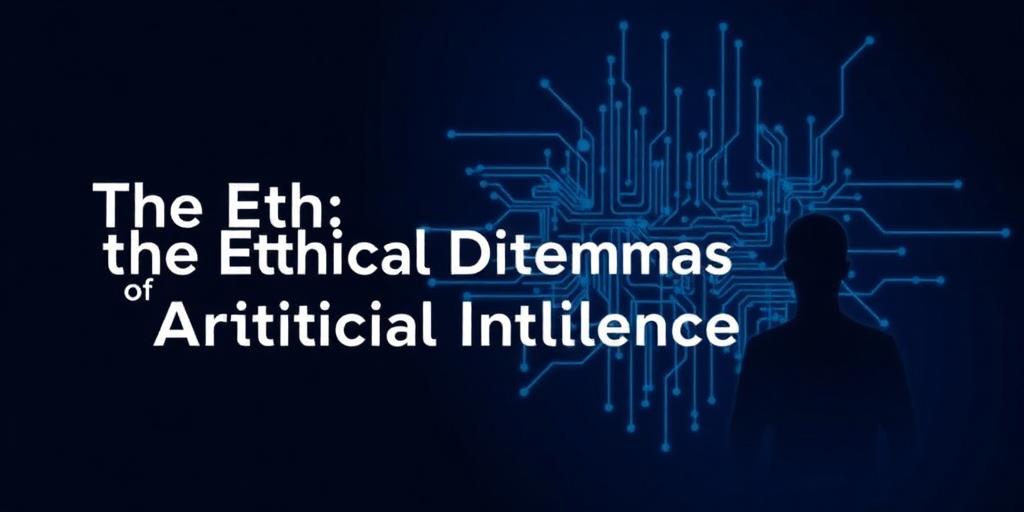The Ethical Dilemmas of Artificial Intelligence: Navigating the Complexities of a New Era
Artificial Intelligence (AI) stands as a transformative force, reshaping industries, economies, and the very fabric of society. Yet, alongside its immense promise, AI introduces a complex web of ethical dilemmas that demand our immediate and thoughtful consideration. As AI systems become more sophisticated and integrated into our daily lives, understanding and addressing these challenges is paramount to ensuring responsible AI development and deployment.
The Core Challenges of Responsible AI Development
The journey towards an AI-powered future is fraught with intricate moral questions. From algorithmic bias to questions of accountability, the ethical landscape of AI is both expansive and nuanced. Addressing these requires a multi-faceted approach involving technologists, policymakers, ethicists, and the public.
Bias and Fairness in AI Systems
Perhaps one of the most widely recognized ethical concerns revolves around bias and fairness. AI systems learn from data, and if that data reflects existing societal prejudices, the AI will inevitably perpetuate and even amplify those biases. This can lead to discriminatory outcomes in critical areas such as hiring, loan applications, criminal justice, and healthcare. The lack of transparent algorithms often exacerbates this, making it difficult to identify and rectify unfair practices. Ensuring fairness in AI systems requires diverse datasets, rigorous testing, and continuous monitoring for equitable outcomes.
Accountability and Responsibility in AI Decision-Making
As AI systems gain increasing autonomy, the question of accountability becomes profoundly complex. When an autonomous vehicle causes an accident, or an AI-driven medical system makes a diagnostic error, who bears the responsibility? Is it the developer, the deployer, the user, or the AI itself? Current legal and ethical frameworks are ill-equipped to definitively answer these questions, necessitating new paradigms for assigning culpability and ensuring justice. This critical area of governance of AI is still nascent but crucial for public trust.
Privacy and Surveillance Implications
AI's prodigious capacity to collect, process, and analyze vast amounts of personal data presents significant privacy challenges. From facial recognition technologies in public spaces to predictive analytics scrutinizing individual behaviors, the potential for pervasive surveillance and erosion of individual privacy is substantial. The ethical imperative here lies in balancing the benefits of AI-driven insights with the fundamental right to privacy, demanding robust data protection regulations and transparent data handling practices. Exploring the societal impact of AI on privacy is a continuous endeavor.
Autonomy, Control, and the Human Element
The progression towards more autonomous AI systems, particularly in sensitive domains like military applications or critical infrastructure management, raises fundamental questions about human control and oversight. How much autonomy is too much? What mechanisms are necessary to ensure that humans retain the ultimate decision-making authority, especially in high-stakes situations? The ethical considerations here extend to defining the boundaries of AI's decision-making power and embedding robust human-in-the-loop protocols.
Job Displacement and Economic Inequality
The economic ramifications of widespread AI adoption are another pressing ethical concern. While AI promises increased productivity and new job categories, it also poses a significant threat of job displacement across various sectors. This potential for widespread unemployment or underemployment could exacerbate economic inequality and societal unrest if not managed proactively. Policymakers, businesses, and educators must collaborate to develop strategies for workforce retraining, universal basic income discussions, and fostering new economic opportunities.
Charting a Course for Ethical AI
Addressing these ethical dilemmas of Artificial Intelligence requires more than just technological solutions. It necessitates the development of comprehensive ethical frameworks, international regulatory cooperation, and multidisciplinary dialogue. Establishing clear ethical guidelines, promoting transparency and explainability in AI, fostering diverse and inclusive development teams, and investing in public education are critical steps. The future of AI hinges not just on its technical prowess but on our collective commitment to steer its development towards a future that benefits all of humanity, ensuring responsible AI development at every turn.




